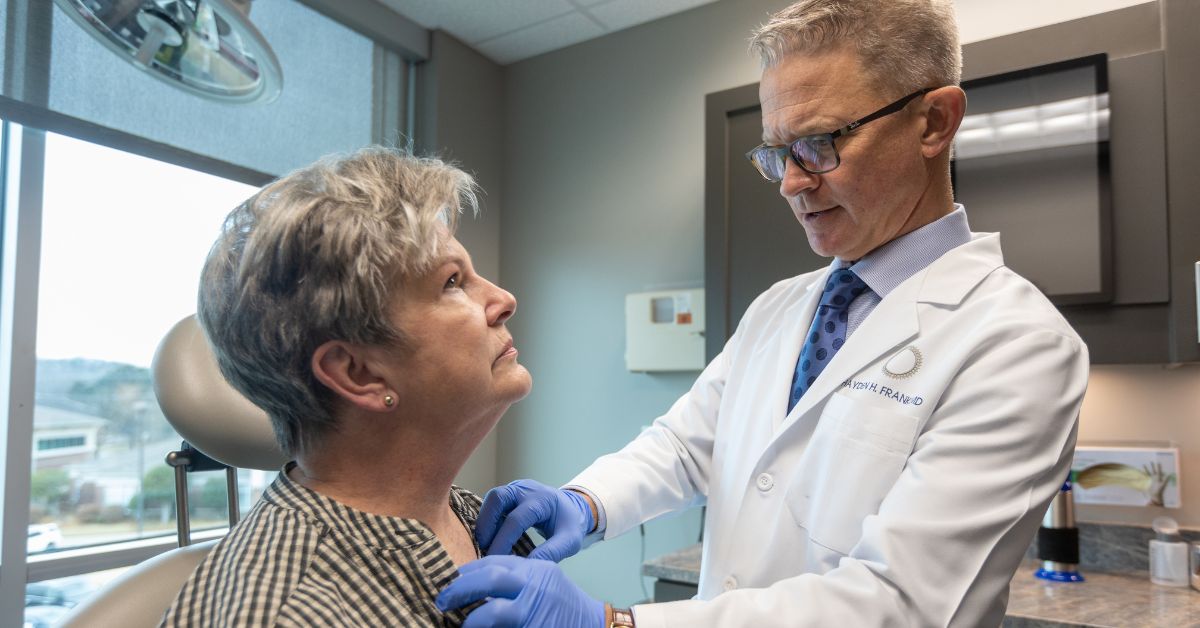Risk Factors for Merkel Cell Carcinoma

Risk Factors for Merkel Cell Carcinoma
Merkel cell carcinoma is one of the most aggressive forms of skin cancer due to its rapid growth and potential for metastasis. Knowing the factors that could increase its occurrence is a key step in defending your skin’s health.
What Are the Risk Factors for Merkel Cell Carcinoma?
These risk factors don’t necessarily guarantee you will develop merkel cell carcinoma (MCC), but it’s important to be aware of them. Similarly, the absence of these known risk factors doesn’t guarantee immunity from MCC, though it does suggest a lower probability of developing it.
The presence of one or more risk factors can be an indication for closer attention and vigilance. Recognizing and acting upon these risk factors is the first step towards proactive health management, especially when dealing with conditions as aggressive as MCC.
Sun Exposure & Ultraviolet Radiation
One of the most recognized and researched risk factors for Merkel cell carcinoma is prolonged exposure to ultraviolet (UV) radiation. Our sun, a massive radiative energy source, emits UV rays, which can be harmful in larger doses over extended periods. Understanding and mitigating UV exposure is crucial in reducing the risk associated with MCC.
Direct exposure to the sun, especially during its peak hours, can result in an increased absorption of UV rays. Places with strong sunlight, high altitudes, or closer proximity to the equator are especially high-risk zones. It’s not just sunbathing that poses a risk—routine activities under strong sunlight can also accumulate UV exposure over time.
Artificial sources of UV light like tanning beds and sun lamps are equally worrisome. These machines emit concentrated UV radiation, which is often much more intense than natural sunlight. As a result, they can significantly raise the risk of MCC.
It’s important to note that the skin damage caused by UV rays is cumulative. It’s not just the severe sunburns that count: every single exposure adds up. This accumulated damage can cause mutations in the skin cells, increasing the risk of cancerous growth.
The Merkel Cell Polyomavirus
Another significant risk factor associated with Merkel cell carcinoma is the presence of the Merkel cell polyomavirus (MCPyV). This virus, discovered relatively recently in the context of medical research, has been identified in a substantial percentage of Merkel cell carcinoma cases, hinting at a direct association.
In many MCC cases, traces of MCPyV DNA have been detected within the tumor cells. This has led researchers to postulate that the virus might play a role in the transformation of healthy Merkel cells into dangerous ones. However, a vast majority of adults have been exposed to MCPyV at some point in their lives, so it’s important to note that the presence of the virus doesn’t guarantee the development of MCC.
Weakened Immune System
The body’s immune system acts as its primary line of defense, warding off infections, pathogens, and even abnormal cell growth. When this system is compromised or weakened, it opens the door to various health complications—one of which is the increased susceptibility to cancers like Merkel cell carcinoma.
Here are some factors that can affect your immune system:
- Immunosuppressive conditions and medications. Conditions such as HIV/AIDS or organ transplantation often require medications that suppress the immune system. These immunosuppressive drugs, while crucial for managing certain health conditions, can inadvertently increase the risk of developing MCC. The dampened immune response struggles to detect and combat abnormal cell growths, which can lead to the rapid progression of this aggressive cancer.
- Chronic diseases. Diseases like leukemia or lymphoma impact the immune system’s functioning. Individuals with such conditions have a higher propensity to develop MCC due to their body’s diminished ability to regulate cell growth and respond to potential threats.
- Aging. As we age, our immune systems undergo changes—including becoming less efficient in responding to threats. This natural decline in immune responsiveness can partly explain the higher incidence of MCC among older populations.
By managing and monitoring conditions that affect immunity, it’s possible to take steps to minimize your risk of developing MCC. Regular checkups, appropriate medications, and staying informed about your health can play a significant role in mitigating the associated dangers.
Age & Sex
The likelihood of developing Merkel cell carcinoma intensifies with age, largely due to age-related immune decline and cumulative risk exposures. Additionally, men face a higher incidence of MCC. This is potentially influenced by a combination of behavioral, genetic, and hormonal factors.
Read Why Merkel Cell Carcinoma is so Dangerous
Contact Franks Dermatology to Understand Your Risk
Understanding the risk factors associated with Merkel cell carcinoma equips you with the information you need to take proactive steps toward prevention and early detection. While some factors, such as age and sex, are non-modifiable, others like sun exposure can be managed with awareness and precaution.
If you have concerns about MCC or would like to learn more about your personal risk profile, contact Franks Dermatology for comprehensive care and expert consultation. Call (501) 246-1042 to make an appointment with our experienced team of dedicated providers in Little Rock.
